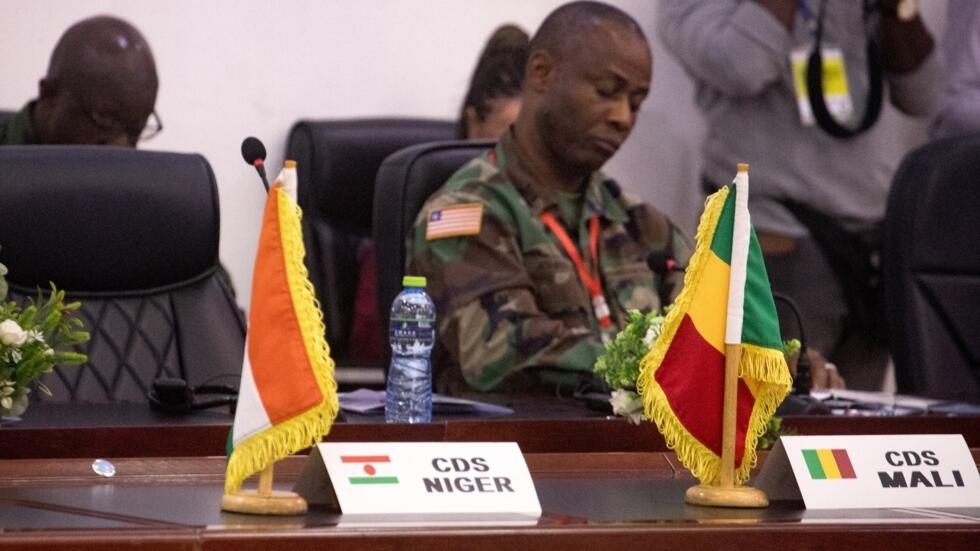Nearly three weeks later, ECOWAS has still not reacted to the September 25 announcement of the extension of the transition in Mali. While the West African organization had fiercely negotiated the electoral calendar of the transition to impose a “ reasonable ” duration on the transition period, how can we understand this silence today? Malian and West African diplomats, technicians and researchers, directly involved or following the issue very closely, explain it.
In Mali, the resumption of the war in the North seems to have eclipsed the discussion on the extension of the transition. After the September 25 announcement of the indefinite postponement of the presidential election in February 2024, supposed to mark the return to constitutional order, the Malian political class almost unanimously expressed its concern and deplored a unilateral decision by the authorities in Bamako. The Economic Community of West African States (ECOWAS) simply did not react: no declaration, no press release.
The body had nevertheless imposed heavy sanctions on Mali during negotiations on the electoral calendar, which had also earned it strong unpopularity among the Malian population, including among opponents of the coup d’état. How can we understand that ECOWAS has gone from such an offensive posture to such silence?
“ Cédéao no longer has an interlocutor in Bamako ”
“ Contacts are completely broken. What would have been the point of speaking to the whole world and not to the Malian transitional authorities? », summarizes one interlocutor. Since ECOWAS imposed a travel ban last February on “members of government and senior officials ” from Mali, Guinea and Burkina Faso, Bamako has completely broken off dialogue with the West African organization.
The ECOWAS mediator for Mali and former Nigerian president Goodluck Jonathan has not set foot in the country for eight months. And it was in the media that the heads of state of the sub-region learned that the Malian presidential election was postponed indefinitely . “ ECOWAS is in embarrassment because it no longer has an interlocutor in Bamako ,” says a source.
Arguments “ kept cold ”?
“ ECOWAS could accept a shift of three or four months,” explains another, “but there has been no exchange ,” continues the same source. According to this interlocutor, “ the technical reasons invoked by Bamako could have been exceeded. There are therefore fears that security or financial arguments will be kept cold to justify, later, a really long extension of the transition. »
The silence of ECOWAS is, however, perceived by many observers not as a sign of concern but as an admission of powerlessness or even as a form of blank check.
Restart the dialogue
“ The priority is to relaunch the dialogue ,” judge several sources, who believe that too brutal communication from ECOWAS would have been counterproductive. These plead for “ a more underground, less visible and less noisy policy ”.
Projects for press releases to “ take note ” or affirm “ concern ” would have been initiated but which did not come to fruition, due to the differences in approaches of the Member States.
“ There is an institutional weakness,” points out an interlocutor, “ the commission is firm but it has no weight. When an important decision has to be made about a country, it is the heads of state who make it. » Which leaves more room for divisions or domestic political concerns.
“ Togo’s troubled game ”
More than a divergence, Togo is directly blamed by several sources for its “ troublesome game ” and its “ lack of solidarity ” with the other ECOWAS countries: “ they are the only ones still talking with the Mali, Togo has become an informal emissary of the juntas ,” accuses an interlocutor.
According to several sources, Lomé’s declared proximity to Bamako, but also to Ouagadougou and Niamey, would arouse the ” annoyance ” of many West African states, who consider this attitude ” negative “: ” They play the godfathers of the putschists, concludes a source, which does not make things easier for an already weakened ECOWAS. » Asked by RFI, Togolese diplomacy did not wish to respond to these accusations.
Priority Niger
There is also “ the case of Niger ” which “ came to block everything ”, several sources also note. ECOWAS would now make it a priority and devote most of its energy to it. At the risk of giving the impression of “ laisser faire ” in Mali, but with the aim of reestablishing a form of authority lost vis-à-vis the coup countries.
“ The case-by-case approach no longer works ”, “ ECOWAS has allowed itself to be overtaken in Mali and Burkina Faso, it wants to catch up with Niger ”, “ the three crises are interconnected ”, also explain fine technicians . They believe that what is happening today in Niamey will have consequences on the cases of Mali and Burkina Faso. And that is what guides ECOWAS’ current strategy.
Exceptional summit?
The next conference of ECOWAS heads of state is scheduled for December 2023 in Abuja. Some member countries would like the organization, before this date, of an exceptional summit on Mali, Niger and Burkina Faso. Not sure they will win their case. Requested by RFI, the ECOWAS communications department did not respond.
The African Union did not react any more than ECOWAS. By virtue of the principle of subsidiarity, the continental organization aligns itself with the positions of the West African regional organization on such an issue.
Source: Radio France Internationale






